Protecting children against violence and exploitation
A. Child labour and its worst forms
1. Lebanon | We Adolescent Girls, We Can Project | Terre des hommes Lausanne
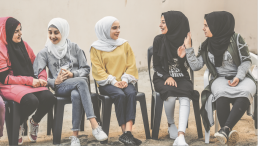
Young girls who were taken off the streets and benefited from the programme in Lebanon
©Tdh/Ahmad Farhart
Hasna, a Syrian refugee in Lebanon, was 12 years-old when her father died. As a result, she was forced to drop out of school and, at the age of 15 years, was due to get married just to be able to survive. Terre des hommes supported her through the We Adolescent Girls, We Can project which empowers girls by informing them about their rights, reinforcing their life skills and supporting networks against child marriage. Terre des hommes also supports the families of children to set up income-generating activities.
Child marriage increases with social and economic pressures and in humanitarian emergencies. Terre des hommes own research in Jordan and Lebanon shows that the challenges of displacement and becoming a refugee are significant factors that contribute to an increase in child marriage. Child marriage poses a serious risk to girls, reducing their chances of receiving education and increasing the risk of violence and exploitation.
The project implemented together with our partners supported more than 2,000 girls like Hasna.
“I am so happy to be back in school and that I no longer feel obliged to get married to support my family and future,” said Hasna.
In 2021, UNICEF estimated that more than 700,000 children in Lebanon were out of school, even though education is compulsory for children aged 6 to 15. In the absence of official monitoring, there is every indication that the situation is continuing to deteriorate “We increasingly see extremely young children, sometimes as young as 4 or 5 years old, working. There are more girls too, and competition between them is tougher ”, notes Alice Hujairi, Terre des hommes’s project manager for child protection in Beirut.
Terre des hommes empowers and protects girls and young women from child marriage and supports those who are already married or divorced with support services and meaningful opportunities. We also support their peers, families and communities and strengthen gender-adapted and child-friendly justice systems.
Learn more about the We Adolescent Girls, We Can project.
Watch a video about the project here.
2. India | Systemic change through education for girls | Terre des Hommes Netherlands
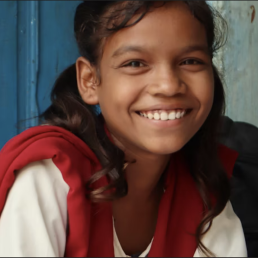
Reena’s back to school journey
In Jharkhand, India, 14-year-old Reena and her family live near mica-rich areas and do not have access to alternative forms of income. This means that most people there are involved in mica collection and processing activities.
When the pandemic hit this area, the lockdown led to a decrease in wages, as well as a lesser demand for daily wage labour.
As schools closed, Reena’s parents could not afford smartphones to access online classes. As a result, Reena and her brother had to drop out of school. Even though both parents were working, their income was not enough to support the family’s basic needs. This meant that the children also had to start working – cleaning, segregating and delayering mica flakes at private factories.
“It was very disappointing for me to leave [my] studies while already enrolled in 8th grade. There was no other option for me. I decided to work in mica processing activities along with my elder brother and mother, to meet our basic survival needs in a time of crisis. I injured myself many times in the factory and it hurt a lot” explained Reena.
Reena’s parents were also thinking of marrying her off, especially since marriages were cheaper during the pandemic.
Fortunately, Terre des Hommes Netherlands project staff Ms. Asha Kumari identified Reena during a home visit in December 2021. Reena and her brother were readmitted to school, and they were supported with educational material. Reena was assisted in the opening of a bank account so that she could receive a scholarship and her mother was encouraged to grow mushrooms as an alternative way to earn money. This initiative was part of a community participative scoping exercise which assessed potential additional livelihood opportunities for mica-dependent families. In two months, the family’s average monthly income increased by 50%.
In 2022, Terre des Hommes Netherlands worked in 5 countries (Kenya, Madagascar, Bangladesh, India and Uganda) on child labour-related interventions, supporting 35,038 people. In India, we have been fighting child labour in mica mining communities since 2015. In 2022, the minister of the Indian province of Jharkhand approved the ‘Dhibra policy’. This legalises the artisanal extraction of mica scrap (dhibra) and means mica miners can now set up cooperatives to jointly defend their rights and interests: a great result.
Some 300,000 people in the area depend on mining scrap for their livelihood. The government will establish a minimum kilo price intended to contribute to a living income for adult mica miners. With this higher income, parents are no longer dependent on their children’s income and can send them to school instead of letting them do this type of dangerous work.
Read more about Reena’s story here.
3. Zimbabwe | Back to School bench project | Terre des Hommes Germany
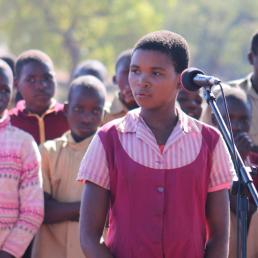
Blessing, a 15 year old girl who went back to school as a result of the project
In the sun-scorched fields of Zimbabwe, where children toil under the weight of responsibility, Terre des Hommes Germany embarked on a mission of hope and transformation known as the Back to School bench project. Launched in October 2021 and supported by the Federal Ministry for Economic Cooperation and Development of Germany, this project illuminated the path to a brighter future for the nation’s most vulnerable children.
Child labour had cast a dark shadow over Zimbabwe’s youth. Official figures reveal that nearly 27% of all boys and girls were forced to work to support their families, often at the expense of their education. The factors contributing to child labour in Zimbabwe are multifaceted and intricate, primarily stemming from the prevailing socioeconomic conditions within the nation. Prominently, the high levels of unemployment, the expansion of the informal economy, and the financial strain on households indirectly compel child labour. The outbreak of the COVID-19 pandemic, along with the subsequent containment measures, significantly exacerbated the situation. School closures, prolonged lockdowns, and the loss of livelihoods by parents led to a notable surge in school dropout rates and an increase in children engaging in labour activities.
In response, Terre des Hommes joined forces with the Coalition Against Child Labour in Zimbabwe (CACLAZ) network in the Chiredzi district of southeastern Zimbabwe. This dynamic coalition comprised a teachers’ union, a child protection organisation, and a farm workers’ union, all driven by a common goal: eradicating child labour and ensuring access to education.
“My name is Blessing, I stopped going to school after my parents died, in 2018 and I was doing small jobs for my grandmother. The teachers came to our community looking for children who were not going to school, we were given stationary: books, crayons and covers for the books. Now we are happy that we can eat porridge and mahewu. I used to skip school but now I came to school on a daily basis because of the porridge we get here.” says Blessing.
Blessing is 15 years old and in grade 6 at the Kusinga Primary School. Her school attendance is good due to support from her caregiver. After she returned to school her caregiver has been very supportive in ensuring that she continues learning.
The Back to School bench strategy was clear: to create child labour-free zones. Villagers received education about child labour and its devastating consequences on children’s development. Simultaneously, CACLAZ engaged local politicians, advocating for universal school attendance across the region. Transitional schools were established to support children who had dropped out of school. Here, all children received invaluable support to bridge learning gaps and transition into regular schools after six months. The project also raised the awareness of children, parents, teachers and community leaders about children’s fundamental right to education which shapes the course of their lives and prevents them from ending up in hazardous work environments.
The impact was profound. In order to prevent child labour in the long term, economic empowerment and alternative sources of income for families and young people in the project region was necessary. So a total of 200 vulnerable households have been supported by the project in the area of goat keeping. Since 2021, 1,700 children were able to reclaim their rightful place in the classroom, breaking free from the shackles of child labour. In total, the project directly reached 3,300 children and touched the lives of an additional 50,000 members of their village communities. In the heart of Zimbabwe, hope is rising, one child at a time, thanks to Terre des Hommes Germany’s and CACLAZ’s Back to School bench project.
Read more about the work done on child labour here (in German).
B. Child safety online and offline
1. South Eastern Europe | Responding to violence against children in schools | Terre des hommes Lausanne
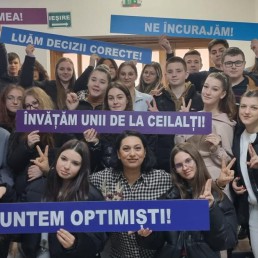
Youth participants in the REVIS program
Copyright: ©Tdh
“Maybe we don’t think about it because there has always been violence and then it’s like, “if it happens, it happens, if it doesn’t, it doesn’t. The workshops encouraged us to think more about how we can help ourselves if we find ourselves in such a situation.” responded a REVIS participant from Romania.
Peer-to-peer violence among children is prevalent across the globe. In Europe, especially in the South-East, many children are reportedly exposed to violence regularly in schools and homes. The socio-cultural norms, social exclusion, poverty, systemic gaps, lack of effective policies, capacity of teachers and students’ lack of faith in the system are the major factors leading to violence, including gender-based and online violence, in schools.
“Until these workshops, we had never talked about violence and what happens to us at school. We have never had the opportunity to say that no one listens to us.” – said a 12-year participant from Serbia.
The overall goal of the REVIS (Responding to Violence in Schools and Adjacent Settings) project, coordinated by Terre des hommes with partner organisations is to prevent, combat and respond to peer violence among children, through transforming social and gender norms and behaviours. 1,600 children, youth, and teachers from 4 countries were involved in activities, child-led social media campaigns, and programs to prevent and reduce peer-to-peer online and offline violence in and around schools and other educational settings.
”The project ideas came from children. Of all the project phases, the action phase is the one they like most. It seems they have got wings and they are taking us along in their flight”, said Mrs. Isabela Cîrstea, a teacher at a school in Romania who participates in the programme.
At present, pupils from 10 high schools in the REVIS program have initiated and developed school violence reduction projects including the creation of posters, drawings, wall painting, theatre plays, etc.
Learn more about the REVIS project here.
Watch a video with messages from youth to decision-makers at the final REVIS conference and a video of the projects created by high school children in Romania here.
2. Italy | indifesa Observatory against child abuse online | Terre des Hommes Italy
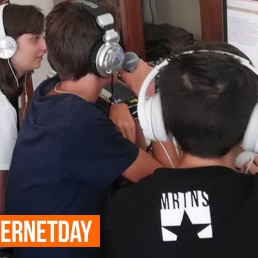
Children participating in the Safer Internet Day event in Italy
In the digital age, the safety of our children extends beyond the boundaries of our homes and schools. It spills into the vast realm of social media, where threats to their well-being often loom in the shadows. In Italy, Terre des Hommes is leading the fight to protect children from online crimes. Since 2014, we’ve operated the indifesa Observatory, the nation’s sole permanent observation point on gender-based violence, discrimination, bullying, cyberbullying, and sexting. Over 64,000 children participate in the Observatory which has become a linchpin, guiding Italy’s institutions and educational community in shaping policies to protect our youth.
In 2018, the indifesa network was launched. It was the first Italian network of WebRadio and young advocates against discrimination, stereotypes, and gender-based violence. High-school students in the network create radio programs that explore these issues, reaching a wide, national audience.
Our advocacy efforts have also yielded tangible results. In May 2022, we presented a set of proposals to the Italian government for regulatory reforms to protect child victims of cybercrime. These proposals were met with enthusiasm from key stakeholders, including several government officials, and representatives from TikTok and Facebook.
On Safer Internet Day 2023, we organised a special event with thousands of children, joined by Polizia Postale, TikTok representatives, lawyers and psychotherapists from the indifesa network to share their web experiences and empower youth with knowledge about tools and rights to protect themselves online. Over 200 classes from 72 secondary schools across Italy participated, and the event’s online video garnered over 1,748 views, showcasing the reach of our efforts.
Terre des Hommes Italy’s journey to protect children online has been marked by determination and collaboration. We’re transforming challenges into opportunities, bringing together voices from all corners of society to create a safer online environment for our most precious resource: our children.
Read more about the project and listen to the podcasts by youth here (in Italian) .
3. Philippines | Dangers of child exploitation online | Terre des Hommes Netherlands
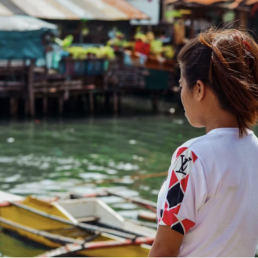
“I want to teach them, but also be their example and show them that anything is possible.”
After moving to her aunt’s house in a new city because she could no longer live with her own parents, Alexa was lonely and struggling. As Alexa tried to cope with the changes, she found it helpful to get to know new people through social media. Like many children, she had no idea of the possible dangers and the dark side of the online world.
“I met a nice person through Facebook. He wanted to meet me, but that went poorly. I was raped and held in a hotel room. I was only found by the authorities after two days.”
Alexa (21) met someone online through Facebook when she was 16. The man enticed her to meet up in person. When she arrived, Alexa was raped and held against her will in a hotel in Cebu.
The number of Filipino children sexually exploited online continues to grow rapidly. Children are often forced into sexual acts through social media.
They may be unaware of the online dangers beforehand or may have no other choice than to earn money this way due to poverty. These deeply traumatic experiences can lead to developmental problems, negative self-image, depression and even suicide.
After being rescued, Alexa stayed in a shelter for two months. She was traumatised and had to try, under the guidance of local aid organisations and authorities, to process what she had experienced. What helped her was knowing that she was not the only victim of sexual abuse perpetrated by predators online. During this journey, Alexa also received financial support from Terre des Hommes that allowed her to start school.
School was more than a learning environment for her: she made friends whom she connected with and was able to get distracted, which helped her process everything.
“It is my dream to teach children. Especially children who cannot go to school because there is no money. I want to teach them, but also be their example and show them that anything is possible. I want to tell them to always keep believing in their dreams. That they should keep going to school and keep telling themselves that they can do it.”
In 2022, Terre des Hommes Netherlands worked in 8 countries (Uganda, Kenya, Bangladesh, Cambodia, India, Nepal, The Philippines and Thailand) on interventions related to sexual exploitation of children. One form of sexual exploitation is online sexual exploitation of children that occurs online and on social media specifically. We were able to reach a total of 1,353,808 individuals through our programmes helping raise awareness and prevent such heinous crimes from being committed against children.
Read more about about the project here.
